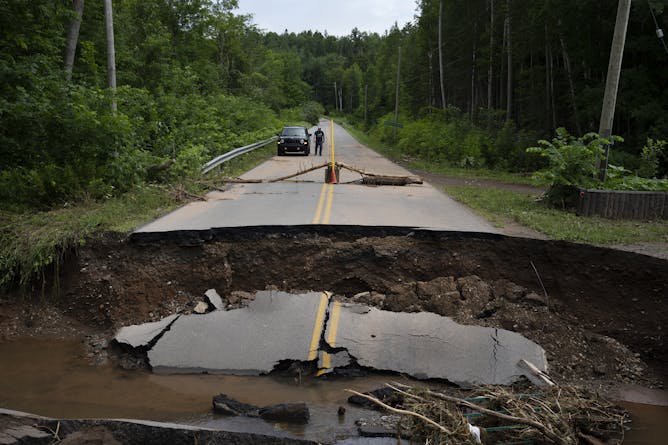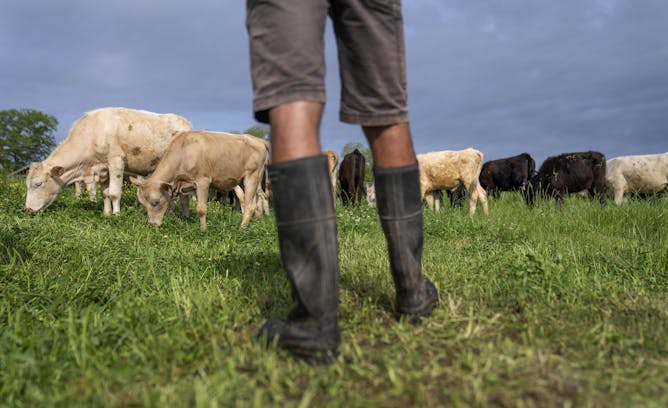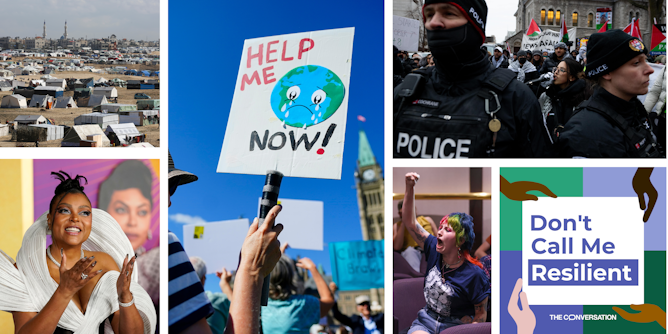|
Most of Canada’s coastal communities, particularly in provinces like Nova Scotia, are at great risk of flooding under current climate change scenarios. What people need more than anything is accurate data to inform them of their flood risk and to help shape resilient coastal development. However, a major barrier to the widespread use of these maps in Canada has been the public itself.
Today, in The Conversation Canada, Kate Sherren from Dalhousie University explores the phenomenon of public resistance to accurate flood risk assessment maps, arguing that this resistance is mostly borne of self-orientation and a fear of the unknown. Meanwhile, flood risk maps are urgently needed to allow us to “focus on rethinking what it means to live a good coastal life in the face of climate change, and how we collectively support those who may face decreases in home or land value.”
Also today:
All the best.
|

A motorist stops to survey the damage to a washed-out roadway near McKay Section, N.S. on July 23, 2023. A long procession of intense thunderstorms dumped record amounts of rain across a wide swath of Nova Scotia, causing flash flooding, road washouts and power outages.
THE CANADIAN PRESS/Darren Calabrese
Kate Sherren, Dalhousie University
Public concerns for real estate value, and a focus on the self, make flood risk maps unpopular. However, these concerns should not dissuade governments from providing resources we can all trust.
|

Canadian sport organizations and governing bodies have much to learn from national team athletes when it comes to improving accountability and preventing costly litigation.
THE CANADIAN PRESS/ASP-Yi-Chin Lee/Houston
Jennifer Walinga, Royal Roads University
Canada Soccer has the potential to model, both nationally and globally, the same standards of accountability and leadership excellence that are expected of national team athletes.
|

Social sciences play a key role in preventing zoonotic diseases from spreading to people from animals.
(AP Photo/David Goldman)
Kaylee Byers, Simon Fraser University; Lara Hollmann, Simon Fraser University; Salome A. Bukachi, University of Nairobi; Sarah Robinson, Simon Fraser University
Pandemics often have animal origins, so prevention is often dominated by health and veterinary sciences. However, social sciences’ role in understanding human behaviour is also crucial to prevention.
|

This image released by A24 shows Greta Lee, right, and Teo Yoo in a scene from Past Lives.
(Jon Pack/A24 via AP)
Hali Kil, Simon Fraser University
The film ‘Past Lives’ provides meaningful insights on how immigrant youth grow into their cultural identity.
|

Image credits: AP/Hatem Ali (Palestinians displaced by the Israeli offensive in Gaza in Rafah in Jan)., AP/Chris Pizzello (Taraji P. Henson), THE CANADIAN PRESS/Sean Kilpatrick (sign at climate protest on Parliament Hill in Ottawa), CP/Spencer Colby (police at a pro-Palestinian protest), Jason Getz/Atlanta Journal-Constitution via AP (rainbow-haired “Stop Cop City” protestor with fist raised), DCMR logo.
Vinita Srivastava, The Conversation; Dannielle Piper, The Conversation; Ateqah Khaki, The Conversation; Jennifer Moroz, The Conversation
The DCMR team has been busy prepping new episodes and next week, we start releasing episodes for season 7, taking our anti-racist lens to the news and issues occupying a lot of our minds these days.
|

Dans les organisations, il est encore difficile de mettre en oeuvre des programmes destinés à atténuer les inégalités entre les hommes et les femmes.
(Shutterstock)
Denis Monneuse, Université du Québec à Montréal (UQAM)
Les inégalités entre les sexes persistent sur le marché de l’emploi, malgré diverses mesures légales et initiatives managériales. Le problème se situe lors de leur mise en œuvre dans les organisations.
|
Podcasts
|
-
Gemma Ware, The Conversation
Bronwen Dalton and Kyungja Jung explain how North Korean women are driving a new form of grassroots capitalism. Listen to The Conversation Weekly podcast.
|
|
Arts
|
-
Małgorzata (Gosia) K. Citko-DuPlantis, University of Tennessee
The first cherry blossom viewing was organized in Japan by Emperor Saga in 812 C.E. In the ensuing years, poetry on cherry blossoms came to have a special place in Japanese culture.
|
|
Health
|
-
Naomi Braithwaite, Nottingham Trent University
Keeping up with the Kardashians can be a real pain. How fashion trends from waist trainers to celebrity endorsed sneakers could do more harm than good.
|
|
Politics
|
-
Rossella Pulvirenti, Manchester Metropolitan University
Investigating sex crimes in a war zone will be hard, but accountability for these crimes against humanity is vital.
|
|